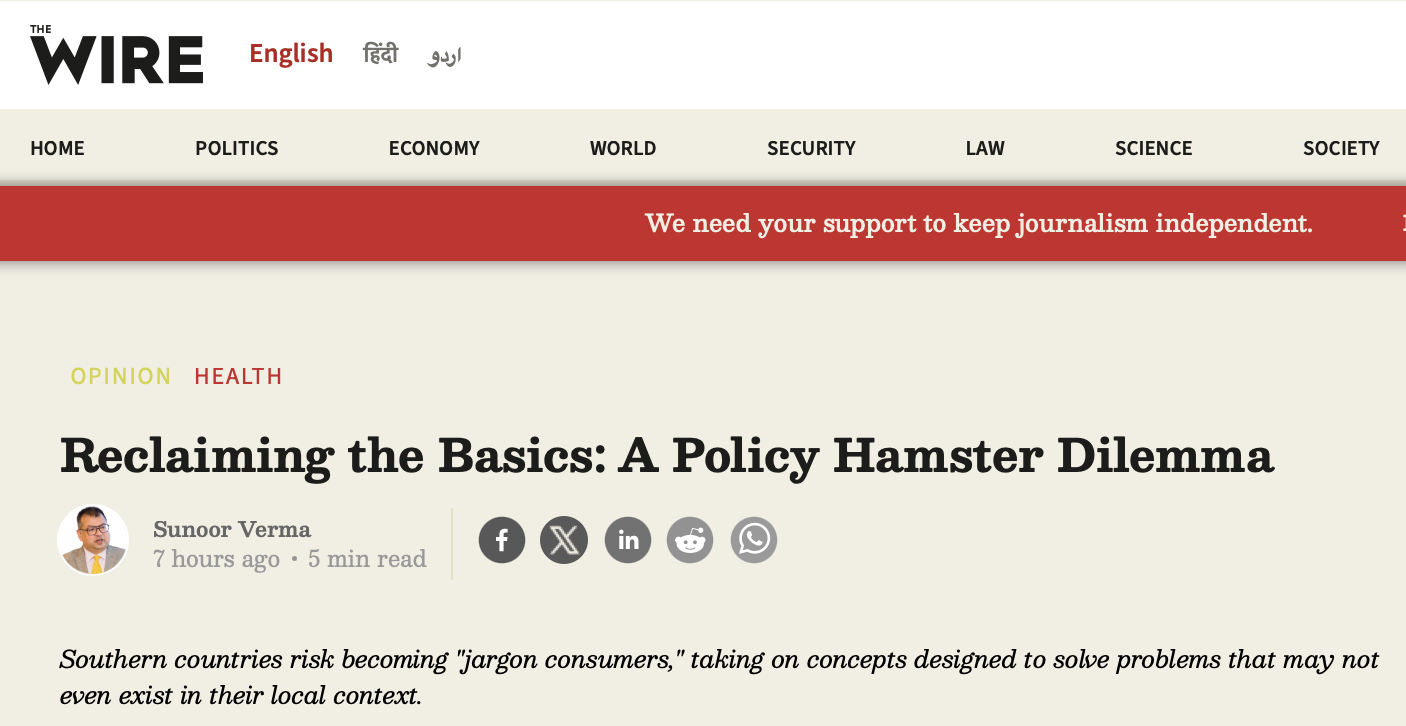A Policy Hamster Dilemma: Reclaiming the Basics

In the development world, jargon has become more than a language—it’s practically an industry. Over the years, we’ve seen concepts evolve from “tropical medicine” to “planetary health,” with each term vying for a place in the lexicon of what’s considered “progressive” policy. Such terms rarely emerge from within the Global South, nor do they respond to its most pressing needs. Instead, these phrases often originate in the think tanks and policy labs of the Global North, in societies that have largely met their basic needs and are now pursuing “high-hanging fruits” like AI in health literacy or antioxidants for wellness. However, while these sophisticated ideals might be feasible in donor countries, they often overlook the day-to-day priorities of the South, where malnutrition, food adulteration, and childhood stunting remain urgent.
The powerful donor agencies in the Global North, who drive development funding, collaborate closely with their domestic universities and think tanks to formulate these high-concept policy initiatives. Driven by a dual purpose of altruism and an implicit belief in the universal applicability of their home-grown frameworks, Northern policy experts often repackage their findings into “international development assistance.” This doesn’t just translate into money; it means exporting terminology and concepts. Terms like “resilience” and “sustainable livelihoods” arrive in the Global South as neatly branded packages from aid ministries and soon filter through UN systems, turning the jargon of the moment into policy mandates that land on policymakers’ desks in Southern countries.
This creates what might be called the “policy hamster wheel” of the Global South: local officials tasked with addressing urgent societal needs find themselves running in place, continuously catching up with the latest fads in global development lingo. The consequences are profound. Instead of focusing on foundational services like nutrition, sanitation, and vaccination, the policy and communication elites in the South are often preoccupied with weaving the latest trendy terminologies into local strategies, generating a lot of visible “action” but making limited real-world progress.
In effect, ministries in the Global South have become staging grounds for capacity-building exercises around the “buzzword of the season.” This means spending precious hours and resources on endless workshops, new conceptual frameworks, and capacity-building seminars while ignoring the basics that could significantly improve people’s lives. Young, ambitious professionals within these ministries, understandably drawn to the allure of international exposure and grants, often prefer to engage in these donor-led programs over “mundane” but critical tasks like improving sanitation or extending healthcare coverage.
Notably, a handful of countries in the South have managed to resist these distractions. #Rwanda, for instance, has declined to embrace every jargon-laden trend in global health. Instead, it has prioritized basic community health needs and practical solutions like maternal care and preventive services. #Singapore‘s policies remain rooted in what works—effective healthcare and education for its citizens—regardless of fashionable global terms like “planetary health.” #Thailand‘s Universal Health Coverage (UHC) and #Vietnam‘s sustained focus on agricultural productivity, primary healthcare, and poverty alleviation highlight a different path: one that leverages global cooperation but remains unswervingly focused on local priorities.
#India‘s vast and complex bureaucracy faces continuous pressure from multilateral agencies to adopt these trends, yet it has devised an innovative safeguard. By regulating access to its senior officials and restricting interaction with international donors, India protects its policy agenda from being overly influenced by external actors. Similarly, #Malawi has designated a single day each month for its officials to meet with international donors, allowing them to devote the rest of their time to local matters. These policies represent a subtle but effective assertion of national sovereignty over development priorities.
Ironically, in this race to keep up with donor-driven fads, Southern countries risk becoming “jargon consumers,” taking on concepts designed to solve problems that may not even exist in their local context. For example, while “resilience” is frequently deployed in discussions on development, tangible measures like social safety nets or flood barriers are often sidelined in favour of “innovative” projects with more appeal to donors. Similarly, “social capital” is promoted abstractly rather than through actionable steps to strengthen local governance or community networks. This may sound progressive on paper, but it leaves ground realities unchanged.
Development jargon is like clutter—each term may have a purpose, but in aggregate, it’s overwhelming. A “back to basics” approach, like Marie Kondo’s tidying philosophy, could be transformative for policy in the Global South. Just as Kondo urges us to keep only what “sparks joy,” policymakers in the South should hold onto frameworks that spark real, context-specific value, decluttering their agendas from terms that do little but create distraction.
The cases of Rwanda, Singapore, Thailand, Vietnam, India, and Malawi are potent reminders that the Global South can carve out an agenda that meets local needs first. Focusing on core issues like healthcare access, sanitation, and education demonstrates that meaningful progress doesn’t require buying into every new policy fashion or development fad that surfaces in the Global North. It’s a reminder that Southern countries don’t need to run on a policy hamster wheel just to be considered “progressive” by Northern funders.
This isn’t about closing the door on international collaboration; it’s about opening it to partnerships that serve real priorities over donor optics. By championing a blend of local focus and global cooperation, policymakers in the Global South can ensure that limited resources drive lasting outcomes—not just new labels in development reports. Southern leaders can steer a steady course toward progress if they assert their agendas with clarity and purpose. Without this resolve, however, the development journey risks drifting aimlessly, buoyed by each passing jargon, yet never genuinely advancing toward meaningful change.
This article was published on 10 November 2024 in www.thewire.in

Dr Sunoor Verma is the President of The Himalayan Dialogues and an international expert in Leadership-Strategic Communication and Global Health Diplomacy. More on www.sunoor.net